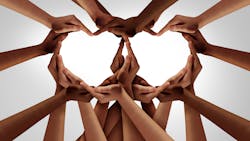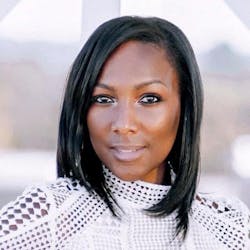What diversity in dental hygiene means to me
by Martelle Coke, RDH
Diversity in dental hygiene means knowing more than one Black hygienist. It means you aren’t relieved or even shocked about seeing another Black face when interviewing at prospective offices—it’s normal. Diversity in dental hygiene means there’s a variety of cultures, ethnicities, and races representing a profession that has been predominately represented by white or Asian men.
Representation matters.
African Americans represent 13.2% of the entire U.S. population. Only 2% of dental hygienists and 5.2% of dentists are Black.
When I think of these numbers, I think of how little we are represented in this profession.
Diversity in this field means every child, regardless of race, religion, ethnicity, or culture will be able to see themselves in their oral health provider.
When I first entered this profession, I knew I wanted to represent my culture in a field where it was not present. Now that I am in it, I love to see the look on my patients’ faces when they see that I look like them. I hope that seeing my face in this field will show them that they can be anything they want and they’ll believe it.
When I started, I was a dental assistant. Starting off I didn’t notice the lack of diversity—I suppose I wasn’t really looking for it. I just knew I loved working in this field. Of course, that speaks to where I was working, but it didn’t seem too important back then. Years later, I was accepted into dental hygiene school. I remember attending our orientation and looking around—I was the only African American face in my class. The front office where patients check in had photographs of each graduating year, from the 1990s to present day. In each of those photos, there were only a few African American students, if any at all. Subconsciously, I felt an immense amount of pressure to prove that I did belong in this program.
On one of our last days in clinic, I was able to meet the very first African American dental hygiene graduate from my school’s program. To say she empowered me in an understatement. I finally was able to speak with someone who knew what I was feeling and what my struggles were being the only Black woman in my class. When we speak about diversity and representation, it isn’t just about perception for scholarships or photos for the office website. It is a sense of belonging and feeling accepted into a space where we are not statistically included.
Representation. Matters.
Read more about Martelle Coke and BrownGirl, the nonprofit she founded:
A new kind of mentorship: How Browngirl, RDH is helping to diversify the dental industry
https://chicagocrusader.com/how-diversity-in-the-dental-profession-could-mean-better-care-for-minorities/
https://etd.ohiolink.edu/apexprod/rws_etd/send_file/send?accession=osu1512123129198428&disposition=inline
Martelle Coke, RDH, is the founder and CEO of BrownGirl, RDH, a nonprofit organization promoting cultural diversity within the dental hygiene field. Established in 2018, BrownGirl, RDH, offers scholarships and supplemental support to dental hygiene students, covering tuition, supplies, equipment, loupes, and national and clinical board fees. Martelle also works to remove cultural and economic barriers to joining the dental hygiene workforce, uses her following to contribute to mission trips, and gives back to the community extensively.

